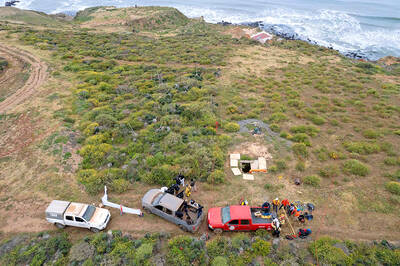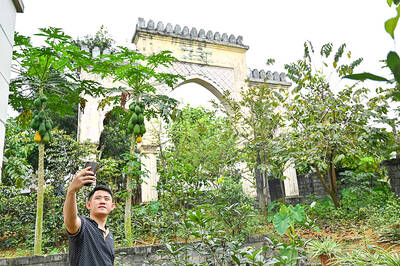Three candidates were yesterday nominated to replace former Sri Lankan president Gotabaya Rajapaksa, who fled the country and resigned last week after protesters overran his residence.
The winner is to take charge of a bankrupt nation that is in talks with the IMF for a bailout, with its 22 million people enduring severe shortages of food, fuel and medicines.
Sri Lanka ran out of foreign exchange to finance even the most vital imports in a crisis triggered by the COVID-19 pandemic but exacerbated by mismanagement, critics say.

Photo: AFP
Months of protests culminated in Rajapaksa fleeing his palace before flying to the Maldives and then Singapore, from where he submitted his resignation.
The parliament yesterday announced that Acting Sri Lankan President Ranil Wickremesinghe is to face former Sri Lankan minister of mass media Dullas Alahapperuma — who has the backing of the main opposition — and Janatha Vimukthi Peramuna (JVP) leader Anura Dissanayake in a secret ballot today.
The three were formally nominated by legislators in a session that lasted less than 10 minutes at the tightly guarded parliament building.
Moments earlier, opposition Samagi Jana Balawegaya (SJB) leader Sajith Premadasa had said on Twitter that he was withdrawing from the race in favor of 63-year-old Alahapperuma, a dissident member of Rajapaksa’s divided Sri Lanka Podujana Peramuna (SLPP) party.
“For the greater good of my country that I love and the people I cherish, I hereby withdraw my candidacy for the position of President,” Premadasa wrote.
He went onto nominate Alahapperuma, a former journalist and rights campaigner in the late 1980s, when Premadasa’s late father, Ranasinghe, ruled the country with an iron fist.
An SJB legislator said that the two men struck a deal overnight for Premadasa to be chosen as the new prime minister should Alahapperuma be elected president.
“We have a common minimum program that we agreed on,” the SJB lawmaker said. “We had only one sticking point about who will be the president and that was sorted out last night.”
However, Wickremesinghe, 73, a veteran political operator and six-time prime minister, has the formal backing of the leadership of the SLPP, which remains the largest party in the 225-member parliament.
If Wickremesinghe is confirmed in the post, he is expected to name Sri Lankan Minister of Public Administration, Provincial Councils, Local Government and Home Affairs Dinesh Gunawardena, a school friend of his and strong Rajapaksa loyalist, as the new prime minister.
The third candidate is Anura Dissanayake, 53, leader of the leftist JVP, which has three parliamentary seats.
A possible fourth candidate, Sarath Fonseka, former commander of the Sri Lanka Army, failed to get support from legislators to enter the presidential race.
The new leader would be in office for the balance of Rajapaksa’s term, which runs until November 2024.
On Monday, Wickremesinghe extended a state of emergency giving sweeping powers to police and security forces.
The protesters whose massive public show of force dislodged Rajapaksa were planning another rally in the capital later yesterday to also demand the resignation of Wickremesinghe.
They see him as an ally and protector of the Rajapaksa clan, which has dominated politics in the country for several years.
Former Sri Lankan president Mahinda Rajapaksa, Gotabaya Rajapaksa’s elder brother and the head of the group, remains in Sri Lanka and party sources said he was pressing SLPP legislators to support Wickremesinghe.
SEE SRI LANKA ON PAGE 8

With the midday sun blazing, an experimental orange and white F-16 fighter jet launched with a familiar roar that is a hallmark of US airpower, but the aerial combat that followed was unlike any other: This F-16 was controlled by artificial intelligence (AI), not a human pilot, and riding in the front seat was US Secretary of the Air Force Frank Kendall. AI marks one of the biggest advances in military aviation since the introduction of stealth in the early 1990s, and the US Air Force has aggressively leaned in. Even though the technology is not fully developed, the service is planning

INTERNATIONAL PROBE: Australian and US authorities were helping coordinate the investigation of the case, which follows the 2015 murder of Australian surfers in Mexico Three bodies were found in Mexico’s Baja California state, the FBI said on Friday, days after two Australians and an American went missing during a surfing trip in an area hit by cartel violence. Authorities used a pulley system to hoist what appeared to be lifeless bodies covered in mud from a shaft on a cliff high above the Pacific. “We confirm there were three individuals found deceased in Santo Tomas, Baja California,” a statement from the FBI’s office in San Diego, California, said without providing the identities of the victims. Australian brothers Jake and Callum Robinson and their American friend Jack Carter

Le Tuan Binh keeps his Moroccan soldier father’s tombstone at his village home north of Hanoi, a treasured reminder of a man whose community in Vietnam has been largely forgotten. Mzid Ben Ali, or “Mohammed” as Binh calls him, was one of tens of thousands of North Africans who served in the French army as it battled to maintain its colonial rule of Indochina. He fought for France against the Viet Minh independence movement in the 1950s, before leaving the military — as either a defector or a captive — and making a life for himself in Vietnam. “It’s very emotional for me,”

The Chinese Communist Party’s (CCP) Central Committee is to gather in July for a key meeting known as a plenum, the third since the body of elite decisionmakers was elected in 2022, focusing on reforms amid “challenges” at home and complexities broad. Plenums are important events on China’s political calendar that require the attendance of all of the Central Committee, comprising 205 members and 171 alternate members with Chinese President Xi Jinping (習近平) at the helm. The Central Committee typically holds seven plenums between party congresses, which are held once every five years. The current central committee members were elected at the